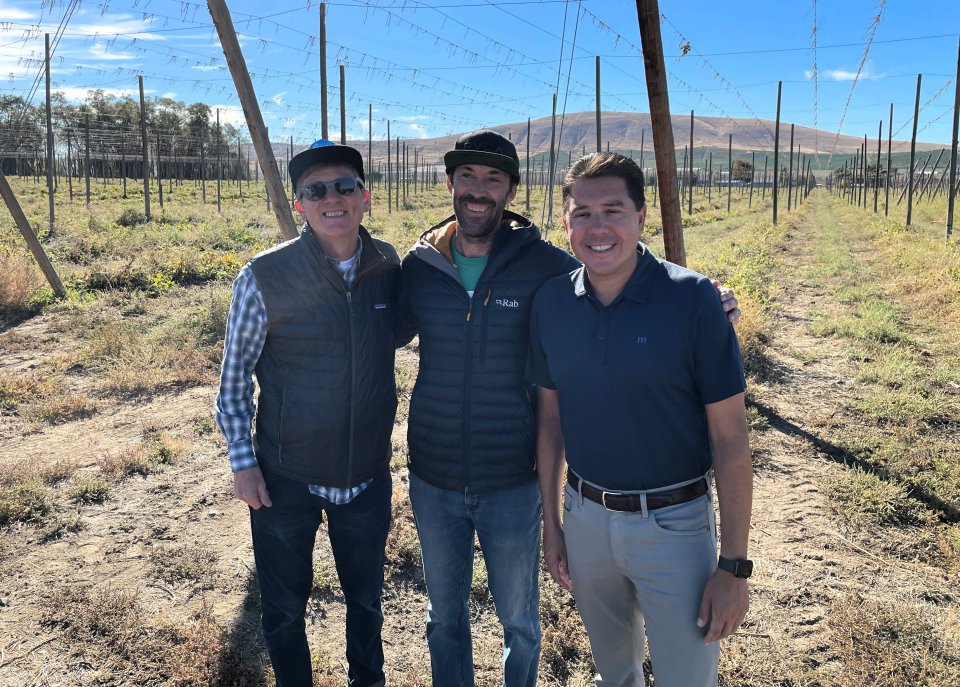EPA $6.3M grant to Salmon-Safe expands agricultural certification program across Columbia Basin
Yakama Nation receives $4M for Yakima, Klickitat River cleanup
SEATTLE (Oct. 4, 2023) -- The Environmental Protection Agency announced yesterday that Portland-based Salmon-Safe will receive a $6.3 million grant from the Columbia River Basin Restoration Program to expand its conservation program in the Yakima Valley and Columbia Basin.
Salmon-Safe works around the Pacific Northwest to incentivize the transition to farming practices and urban development that protect water quality, maintain watershed health and restore habitat. Salmon-Safe is one of the nation’s leading environmental certification programs with more than 100,000 acres of farm and urban lands certified in Oregon, Washington, Idaho and British Columbia.
“Salmon-Safe is doing innovative work to grow our agricultural economy and expand voluntary efforts for a cleaner, healthier environment for fish and for people,” said EPA Region 10 Administrator Casey Sixkiller. “Consumers are seeking food products they can trust are supporting salmon recovery and the health of our river systems. EPA is proud to fund an expansion of this critical effort.”
The grant will scale up Salmon-Safe's work to engage new farmers, ranchers, developers and other land managers in voluntary actions to protect water quality, reduce toxics and enhance climate resiliency in the Columbia Basin.
Salmon-Safe will provide subawards to partners across the Columbia Basin—from conservation districts working with farmers in the Yakima Valley, to Tribal partners working to transition leased land to practices more protective of water quality and conservation organizations working on agricultural stream restoration projects in upper Snake River tributaries. These partners will deliver outreach, certification and technical assistance to over 5,000 farmers and other land managers in key Columbia River tributaries.

“The grant accelerates a market-based movement of partnering organizations and conservation districts and Tribes working together to inspire water quality protection actions and climate resiliency efforts far into the future,” said Dan Kent, Salmon-Safe co-founder and executive director.
Farmers, growers and ranchers benefit from Salmon-Safe certification through expanded connections to higher-value markets in return for reduced polluted runoff, improved habitat and increased water quality.
“Roy Farms is committed to the health of the Yakima River,” said Michael Roy, president and CEO. “Salmon-Safe provides us with the science-backed framework to ensure that we’re doing our part to protect water quality and downstream fish. And we appreciate that the craft breweries that our customers value and seek out Salmon-Safe certified hops.”
Grants to Yakama Nation
EPA also announced $4 million in grants from the Columbia River Basin Restoration Program to the Confederated Tribes and Bands of the Yakama Nation. “Cleanup of our rivers is critical to protecting tribal treaty resources and human health,” said Sixkiller. “EPA is proud to fund efforts by the Yakama Nation to address contamination and restore fishing grounds that have been used for generations.”
The Tribe will use the funds to remove waste materials from two separate locations - a 12-mile reach of the Yakima River and the Lyle Falls traditional tribal fishing area on the Klickitat River. The projects will help improve community health, protect ‘First Foods’ and traditional medicines.
The cleanup projects will identify impacts to human health, remove garbage and support salmon recovery.
"Since Time Immemorial, Yakama oral traditions teach us that the ‘choosh’ (water) is the blood of our Mother, the Land. That in order for all things to grow healthy as the Creator had intended, especially our Sacred First Foods, choosh must be pure of any harmful effects for everything, including ourselves as human beings. The river clean-up moves in that direction of a healthy river for all living things," said Davis “Yellowash” Washines, Elder of Klickitat Tribe of the Yakama Nation.
About the Columbia River Basin Restoration Program
Congress amended the Clean Water Act in 2016 to establish EPA’s Columbia River Basin Restoration Program to engage tribal and underserved communities in efforts to identify and reduce threats to their environment and community health. EPA developed a voluntary, competitive grant program to fund environmental protection and restoration projects throughout the Basin. Eligible entities include state, Tribes, and local governments, regional water pollution control organizations, nongovernmental organizations, and soil and water conservation districts.
The Columbia River Basin Restoration Program received $79 million in the Biden Administration’s Bipartisan Infrastructure Law in 2021. This increase in competitive grants throughout the Basin will help reduce toxics in fish and water using agricultural best management practices, green stormwater infrastructure, pollution prevention, contaminated sites cleanup and community education and engagement.
The Columbia River Basin covers 260,000 square miles in Idaho, Oregon, Washington and Montana; and smaller portions of Wyoming, Nevada and Utah, including lands of 16 federally recognized Tribes. Human activities contributed toxic contaminants to the environment that pose a risk to human health and threaten important species and habitats in the Basin. Toxics in fish are a primary health concern for Tribal people in the Columbia River Basin and other high fish consumers.
EPA Region 10 (Pacific Northwest) - Serving Alaska, Idaho, Oregon, Washington and 271 Tribal Nations. Visit us online, follow us on Twitter and Facebook, and subscribe to our RSS feed.
